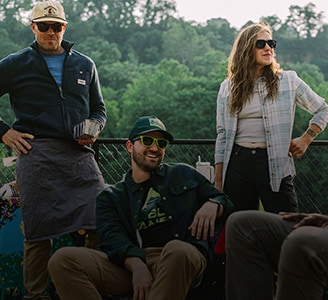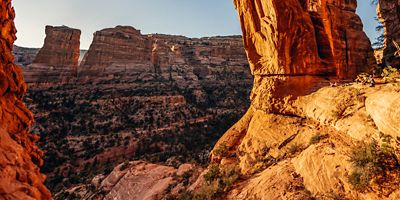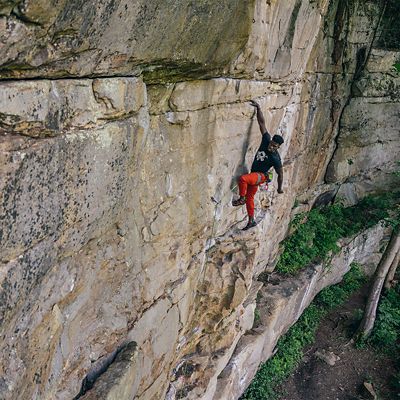Alex Johnson is everybody’s hero. First, there’s the climbing accolades. Johnson (she/her) is a two-time Bouldering World Cup gold medalist and has ticked a number of impressive first female ascents (FFAs), including The Swarm (V14) in Bishop, California. Beyond that she’s an enthusiastic youth coach and an involved member of the climbing community—not to mention one of the first pro competition climbers to come out publicly as LGBTQ+. Add it up and you’ve got a true role model in more ways than one.
Johnson took to climbing early in life. Though she grew up camping and fishing with her dad around the Upper Midwest, her parents quickly realized that she needed a different outlet for all the restless monkey-bar swinging and tree-climbing. So, around age 7, they took her to a climbing gym in western Wisconsin where she grew up. The sport clicked instantly. Soon, she was competing.
“I love that it’s an individual sport and you’re on your own and you’re the only one who can push yourself to succeed,” Johnson says. “But at the same time, there’s a really supportive community.” Those critical ties held her interest. In high school, Johnson dealt with ongoing bullying. And it was sports—first climbing, then track and field—that provided some solace. After a break from climbing, Johnson returned to the sport during college at Minnesota State University—and won gold in her first stage of the 2008 World Cup tour. Next, she moved to Salt Lake City.
“It was like being a kid in a candy shop,” she says. “I was in the mountains for the first time. I felt like I had so much to do and so much to make up for.” She started climbing outdoors more regularly, channeling the love of the woods she’d developed as a kid. In some ways, she said, it felt like coming home.
Since then, Johnson has gone on to win more national and international competitions and ticked some of her hardest climbs to date. She’ll also star in the Reel Rock film, Big Things to Come, debuting in March 2022.
We sat down with Alex to talk about her life as a professional athlete—and as a role model for young climbers everywhere.
PUBLIC LANDS: You came out publicly as LGBTQ+ in 2018. What was it like making that decision?
ALEX JOHNSON: It was actually very spontaneous, and not something I’d planned on doing at all. Instead, it just happened. I got to this point where I didn’t care anymore what people thought about me, and as soon as I posted it on Instagram, I felt relieved. The response was 100% positive. It was so relieving. And it allowed me to open up more and be myself, and that really amplified my climbing. Before coming out, I was somewhat timid in my movement and training. Now, it feels like I’m holding nothing back.





